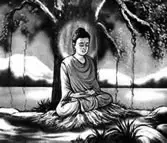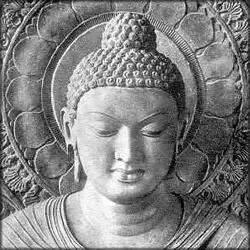The last words of the Buddha
Buddha (circa 563 BC – circa 483 BC), the founder of Buddhism, was born in Lumbini, Nepal as Siddhattha Gautama (or Gotama). His biography varies from one Buddhist tradition to another, but they all describe the course of his life as following this pattern – ‘birth, maturity, renunciation, search, awakening and liberation, teaching, death’.
His final words were:
I exhort you: All compounded things are subject to vanish. Strive with earnestness.
Last Days of the Buddha, Vajira and Story, 1998
Background to the Buddha’s last words

“Buddha” means “the enlightened (or awakened) one”. After an early life of privilege as a prince in Nepal, Gautama was escorted from his palace to see the real world. The sights of a crippled old man, a diseased man, a decaying corpse and an ascetic affected him profoundly. He came to the realization that age, disease, death and pain were inescapable and that not even his life of riches made him immune from them. He undertook to adopt the life of an ascetic, to search for the truth and liberation from suffering.
After some time, he found that extreme asceticism wasn’t the route to follow and discovered what Buddhists call the Middle Way – the path of moderation, separate from the extremes of self-indulgence and self-mortification.
Buddha – Bohdi treeHe eventually seated himself beneath the Bodhi tree – in Bodh Gaya, India and vowed not to arise until he had found the truth. After a prolonged period of meditation, he achieved the enlightenment that is the root of the Buddhist religion.
He continued as a teacher for many years, gathering a group of followers. On the day of his death he gave them his final teaching. The precise English translation of these final words, like all Buddhist teachings, is open to interpretation as it was spoken in Pali and passed on orally, not being written down for some centuries after Buddha’s death. One such interpretation is:
“Behold, O monks, this is my advice to you. All component things in the world are changeable. They are not lasting. Work hard to gain your own salvation.”

